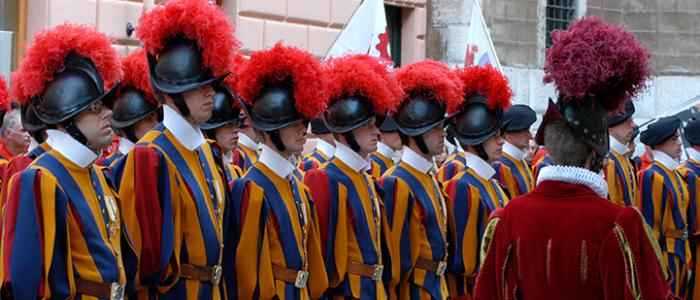
M.2 How can I be a Christian in the armed forces? Is a Catholic a better soldier?
The Bible teaches “You shall not kill” (Ex 20:13), and still Christians enlist in the military to wage wars… “You shall not murder” is a better translation, for in extreme cases the use of (lethal) force is acceptable in defence – as long as it is proportionate to the threat and in defence of the weak and vulnerable. It is even a very Christian thing to stand up for those in need. Life is infinitely precious to God, and it needs to be defended.
As long as a lasting world peace has not been achieved, some Christians will have to wield their swords to wade off evil and bring about peace, but they use violence with pain in their heart. As Pope John Paul II said, war is not always unavoidable, but is always a defeat for humanity. Christians can be great soldiers if in every action they work to defend and glorify God’s love, justice, compassion, reliability and selflessness.
Why must human life be respected?
Human life must be respected because it is sacred. From its beginning human life involves the creative action of God and it remains forever in a special relationship with the Creator, who is its sole end. It is not lawful for anyone directly to destroy an innocent human being. This is gravely contrary to the dignity of the person and the holiness of the Creator. “Do not slay the innocent and the righteous” (Ex 23:7) [CCCC 466].
Why is it not permissible to take one’s own life or the lives of others?
God alone is Lord over life and death. Except in the case of legitimate self-defence of oneself or another, no one may kill another human being. An attack on life is a sacrilege committed against God. Human life is sacred; this means that it belongs to God; it is his property. Even our own life is only entrusted to us. God himself has given us the gift of life; only he may take it back from us. The Book of Exodus, translated literally, says “You shall not murder” (Ex 20:13) [Youcat 378].
What attacks on human life are forbidden by the 5th Commandment?
Murder and acting as an accomplice to murder are forbidden. Killing unarmed civilians during a war is forbidden. The abortion of a human being, from the moment of conception on, is forbidden. Suicide, self-mutilation, and self-destructive behaviour are forbidden. Euthanasia—killing the handicapped, the sick, and the dying—is also forbidden. Today people often try to get around the Fifth Commandment with seemingly humane arguments. But neither euthanasia nor abortion is a humane solution. That is why the Church is perfectly clear on these questions. Whoever participates in an abortion, forces a woman to undergo an abortion, or merely advises her to do so is automatically excommunicated—just as with other crimes against human life. If a psychologically ill person commits suicide, responsibility for the act of killing is often diminished and in many cases completely annulled [Youcat 379].
Why is legitimate defence not opposed to the respect for life?
Because in choosing to legitimately defend oneself one is respecting the right to life (either one’s own right to life or that of another) and not choosing to kill. Indeed, for someone responsible for the life of another, legitimate defence can be not only a right but a grave duty, provided only that disproportionate force is not used [CCCC 467].
Why is killing permissible in the case of legitimate self-defence?
Someone who is actually attacking the lives of others may and must be stopped, if necessary by killing the attacker himself. Legitimate defence against aggression is not only a right; for someone who bears the responsibility for the lives of others it can even become a duty. Nevertheless, legitimate defence must not employ wrong, inappropriately harsh methods [Youcat 380].
What is legitimate defence?
The prohibition of murder does not abrogate the right to render an unjust aggressor unable to inflict harm. Legitimate defence is a grave duty for whoever is responsible for the lives of others or the common good [CCC 2321].
“Law enforcement — military and police — have the mission of ensuring a safe environment, so that each and every citizen can live in peace and serenity. [In your families, in the various areas in which you operate, may you be instruments of reconciliation, builders of bridges and sowers of peace.] Indeed, you are called not only to prevent, manage and put an end to conflicts, but also to contribute to the building of an order founded on truth, on justice, on love and on freedom, according to St John XXIII’s definition of peace in his Encyclical Pacem in Terris (nn. 18 ff.)” [Pope Francis, General Audience 30 April 2016]




